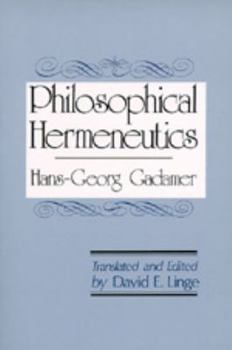Philosophical Hermeneutics
Select Format
Select Condition 
Book Overview
This excellent collection contains 13 essays from Gadamer's Kleine Schriften, dealing with hermeneutical reflection, phenomenology, existential philosophy, and philosophical hermeneutics. Gadamer... This description may be from another edition of this product.
Format:Paperback
Language:English
ISBN:0520034759
ISBN13:9780520034754
Release Date:September 1977
Publisher:University of California Press
Length:304 Pages
Weight:0.91 lbs.
Dimensions:0.7" x 6.0" x 8.9"
Customer Reviews
1 rating
Use the Hermeneutic lens to "see" the world
Published by Thriftbooks.com User , 16 years ago
I read this book for a graduate seminar on philosophy of art. Hans-Georg Gadamer's "Philosophical Hermeneutics" is really a companion book to his "Truth and Method," which is a seminal work. "Philosophical Hermeneutics" touches on such areas of investigating epistemology, ontology, teleology, history, and the social sciences. Hermeneutics first grew out of bible interpretation, interpreting law code, and the study of how humans communicate and use language, both in its verbal and written forms. Gadamer has taken hermeneutics to a whole new level, which touches on interpreting all communication, history, and the social sciences including the humanities. This book has caused me to "see" everything in a new philosophical light. When reading Gadamer, one instantly finds that he was influenced by Martin Heidegger, who he studied under, Hegel, and Aristotle. Hermeneutics is an interpretive methodology of a historically situated, linguistically mediated, contextualist and antifoundationalist theory of understanding. I know that is a mouthful, so the following will unpack this definition. The God Hermes is the source of the word "hermeneutics" Hermes the "messenger" was the go between the Gods and humans thus the word hermeneutics. For Gadamer, interpretation is always connected with the "as," interpretation assumes that there are multiple ways or "lenses" with how we engage works. A different lens will produce a different way of seeing things. So, if our "as" is "cognitive knowledge" then we would approach a thing accordingly. If our "as" is "practical usefulness" then we approach it accordingly. For example, a botanist wants to understand what makes a tree a tree, a carpenter sees a tree as a source of lumber. Thus, hermeneutics is about the idea that there are many ways to interpret, which is why history is so important. It can also be present the world. Does historical inheritance allow for a blank slate? No, no divorce from what we are to be able approach a work in pure disinterestedness as Kant would have us do. No separate space in time. No pure present separated from the future. History doesn't tell us about the past, but about ourselves. Every present has sense of future, not just the past. Gadamer's idea of interpretation, is to turn away from the idea of truth as a simple matter of fact, or certainty or a single principle. The idea of interpretation is that it is something that is "open." We use the word "interpret" that way when we say, "well how do you interpret that work"? This question means that there is not one way of reading the work. Unfortunately, though the difference between interpretation and fact is that a fact is not something open to interpretation, and therefore interpretation is seen as some kind of deficiency. It is seen as a lesser matter because it is open, and can't be secured by some kind of decisive result. A wide array of possibilities is what hermeneutics looks for; it is not just making





